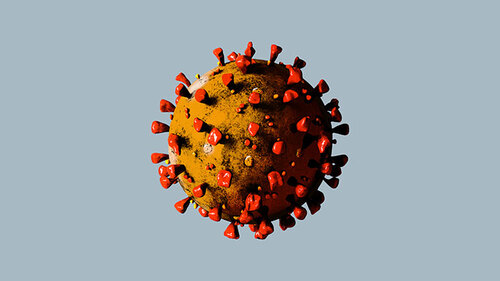
gettyimages / sdominick / sankai Error in renowned study: Corona infected people are contagious up to six days before the onset of the first symptoms.
Monday, 08/17/2020, 6:54 pm
Anyone who had contact with someone infected with Covid 19 two days before the outbreak of the disease must be tested. It is common knowledge. But researchers have now found that this is apparently not enough.
According to previous knowledge, people infected with Covid-19 are contagious two days before the onset of symptoms. This is what it says in the “Sars-CoV-2 profile” of the Robert Koch Institute (RKI): “In addition, a considerable proportion of people from other, infectious people are probably infected in the 1-2 days before their symptoms begin ".
Surf tip: You can find all the news about the corona pandemic in the news ticker from FOCUS Online
The contact person is anyone who had to deal with a person infected with corona two days before the first symptoms appeared. In this case, the contact person must have himself tested for the virus, because then there is an urgent suspicion of infection. Most people in Germany should be familiar with this by now.
But now researchers from the Swiss Federal Institute of Technology (ETH) Zurich declare that this rule is wrong. Corona patients are not only infectious up to two days before illness, but up to six. That would have massive implications for tracking contact persons and chains of infection. Because, according to the researchers, contacts would have to be traced back up to four days in order to catch 90 percent of presymptomatic infections.
Previously: infected people were contagious up to two days before the outbreak of the disease
The ETH researchers refer to a study by the University of Hong Kong, which the RKI also cites as a source for the infectivity of presymptomatic vectors and which is the basis for corona contact tracing in most countries around the world. In the study, in which the epidemiologist and leading epidemic expert of Asia Gabriel Leung, who also advises the World Health Organization, was involved, 77 pairs of infections were examined that had been shown to have infected each other.
The researchers found that infected people were contagious up to two days before the onset of the disease, although the highest level of infectivity was shortly before the onset of symptoms. They published their results on April 15th in the journal "Nature Medicine".
Researchers find errors in study on which tracing is based
Now, four months later, a research team led by Sebastian Bonhoeffer, Professor of Theoretical Biology at ETH Zurich, has found an error in the study by his colleagues from Hong Kong: According to their calculations, infected people are contagious for longer, up to six Days before the first symptoms appear. The researchers have just published their results in the “Swiss Medical Weekly”.
Specifically, they refute the fact that 98 percent of presymptomatic infections occur in the two days before the onset of the disease, as calculated by the authors of the original publication. Instead, their new analysis shows that it is only 61 percent - which in turn means that tracing the contacts in the two days before the onset of the disease will not record all secondary infections.
"If you want to intercept 90 percent of the presymptomatic infections, you would have to trace the contacts back up to four days," said Peter Ashcroft, who discovered the error in the Chinese study, in relation to the "Neue Zürcher Zeitung". The error has now been corrected in the original publication.
"We informed the authors in Hong Kong and they agreed to our correction," said Bonhoeffer. So in their updated study it now says:
Our analysis suggests that viral shedding may begin 5 to 6 days before the appearance of the first symptoms. ("Our research suggests that virus excretion could begin as early as 5 to 6 days before the onset of symptoms.")
Potential consequences for tracking contacts
But what does that mean for tracking contacts? “The aim of tracing is to ensure that as many people as possible who had contact with a newly confirmed case during the infectious phase go into quarantine. But if you are already contagious four days in advance, you would have to adjust the time frame for classic and digital tracing accordingly, ”the“ NZZ ”quotes the epidemiologist Marcel Salathé from the ETH Lausanne.
The RKI is currently checking the results of the study
The RKI is also currently thoroughly examining the study, as it announced when asked by FOCUS Online. Based on various studies and our own experience, for example from the outbreak at the automotive supplier Webasto, the two-day rule has been included in the tracking of contact persons since January.



